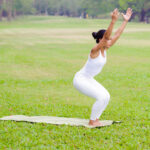
By Laura O’Reilly-Stanzilis
A fall is defined as an event which results in a person coming to rest inadvertently on the ground or floor or other lower level. It is a loss of balance which results in uncontrolled contact with a surface or object. Some falls result in injury and can cause pain and suffering and impact quality of life. Let’s face it- one fall can have you out of commission for a while.
According to the National Council on Aging falling is not an inevitable result of aging.
Through evidence-based interventions, practical lifestyle adjustments, the number of falls among aging and older adults can be substantially reduced.
6 Tips to Help to Prevent Falls
- Find a good balance and exercise program which is taught by a qualified exercise professional: Look to build balance, strength, and flexibility. Contact your local YMCA, fitness facility, yoga studio and area agency on aging for referrals. Find a program you like and take a friend.
- Talk to your health care provider: Ask for an assessment of your risk of falling. Share any history of recent falls.
- Regularly review your medications with your doctor or pharmacist: Make sure side effects aren’t increasing your risk of falling. Take medications only as prescribed.
- Get your vision and hearing checked annually and update your eyeglasses: Your eyes and ears are key to keeping you on your feet.
- Keep your home safe: Remove tripping hazards, increase lighting, make stairs safe, and install grab bars in key areas.
- Talk to your family members: Enlist their support in taking simple steps to stay safe. Falls are not just an issue affecting only seniors.
- Wear comfortable proper fitting shoes with good support.
- Older adults should keep beds low to the floor to prevent a fall while getting out of bed
Laura O’Reilly Stanzilis RN MSM is the Executive Director of the North Jersey Health Collaborative. She can be reached at laura@njhealtmatters.org

